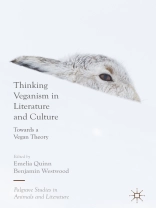This collection explores what the social and philosophical aspects of veganism offer to critical theory. Bringing together leading and emerging scholars working in animal studies and critical animal studies, Thinking Veganism in Literature and Culture shows how the experience of being vegan, and the conditions of thought fostered by veganism, pose new questions for work across multiple disciplines. Offering accounts of veganism which move beyond contemporary conceptualizations of it as a faddish dietary preference or set of proscriptions, it explores the messiness and necessary contradictions involved in thinking about or practicing a vegan way of life. By thinking through as well as about veganism, the project establishes the value of a vegan mode of reading, writing, looking, and thinking.
Table of Content
Introduction: Thinking Through Veganism Emelia Quinn and Benjamin Westwood.-Part I Politics .-Vegans in the Interregnum: The Cultural Moment of an Enmeshed Theory Laura Wright.-Part II Visual Culture .-Remnants: The Witness and the Animal Sara Salih.-The Vegan Viewer in the Circum-Polar World; Or, J. H.Wheldon’s The Diana and Chase in the Arctic (1857) Jason Edwards.-Trojan Horses Tom Tyler.-Contents.-Vegan Cinema .-Anat Pick.-Part III Literature .-Monstrous Vegan Narratives: Margaret Atwood’s.-Hideous Progeny .-Emelia Quinn.-On Refusal .-Benjamin Westwood.-The Unpacking Plant: Gleaning the Lexicons of Lean Culture .-Natalie Joelle.-Part IV Definitions .-Ethical Veganism as Protected Identity: Constructing.-a Creed Under Human Rights Law .-Allison Covey.-A Vegan Form of Life .-Robert Mc Kay.-Conclusion .-Emelia Quinn and Benjamin Westwood.-Index
About the author
Emelia Quinn is a DPhil candidate and Wolfson Foundation scholar in the Faculty of English Literature and Language at the University of Oxford, UK. Her thesis establishes a transhistorical and transnational trajectory of literary veganisms, from the early nineteenth century to the present. She has previously published in The Journal of Commonwealth Literature and Society & Animals, with research interests across veganism, animal studies, and queer theory.
Benjamin Westwood is Departmental Lecturer in the Faculty of English Literature and Language at the University of Oxford, UK, and is finishing a thesis on animals and the intersections of classification and literary form in Victorian literature. He recently contributed an essay to an edited collection, Bathroom Songs: Eve Kosofsky Sedgwick as a Poet (2017), and has an essay on “Edward Lear’s Dancing Lines” forthcoming in Essays in Criticism.












